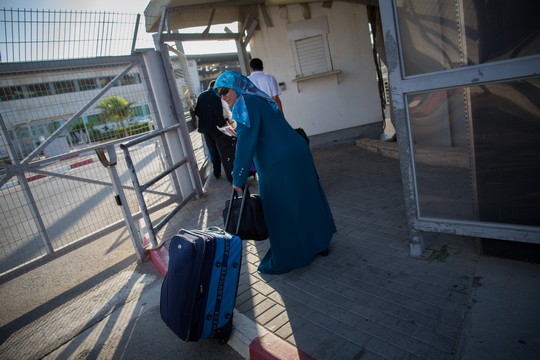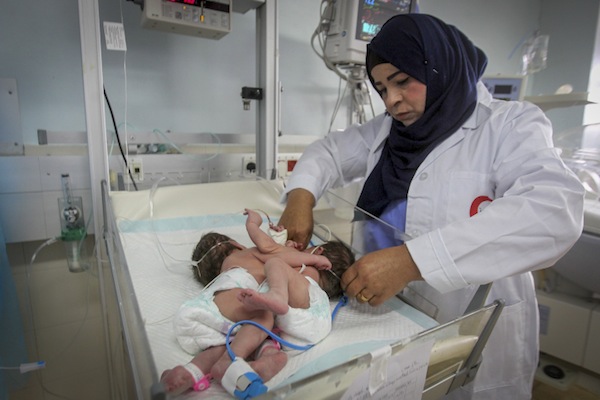The attempt to blame ill Palestinians for the deficiencies of Israel’s healthcare system distracts from the fact that there is only one sovereign responsible for the state of medical care in the occupied territories.
By Ran Goldstein

A recent Israeli media investigation made headlines over the last few weeks after concluding that Israelis in the country’s periphery are losing out as a result of Israel’s providing medical treatment to Palestinians from the West Bank and Gaza Strip. But these conclusions are manipulative.
Let’s begin with what should be self-evident under international humanitarian law: Israel, as the entity that oversees the conditions that impact health in the Gaza Strip and the West Bank (such as water, electricity, and nutrition), is obligated to provide medical services in the event that the Palestinian Authority is unable to do so.
The standard and scope of these medical services should, as long as the Israeli government maintains the occupation, be equal to those in Israel. As such, treating Palestinians in Israeli hospitals does not constitute altruism and does not go above and beyond the letter of the law.
Yet most Palestinians from Gaza and the West Bank who receive exit permits for medical treatment are not admitted to hospitals in Israel. Rather, the permits largely allow them to be treated in hospitals in East Jerusalem, or in the West Bank if the patients are coming from the Gaza Strip. Some also go to Jordan or other countries.
Between 2013 and 2015 around 260,000 Palestinian permit holders seeking medical treatment entered the West Bank and Jerusalem, according to the Knesset Research and Information Center. Around 61,000 were admitted to Israeli hospitals.
The vast majority of those in the second group were treated in hospitals in Jerusalem and the center of the country, and not in hospitals in the periphery. The reason that Palestinians are admitted to Israeli hospitals in the first place is because the under-developed Palestinian healthcare system is unable to meet their needs. In Gaza, for example, cancer patients cannot generally receive the treatment they require.
The Palestinian Authority covers patients’ costs, and Israel uses its tax on the PA to recover its debts. The price Palestinians pay to Israeli hospitals is around five percent higher than that paid by Israeli health funds for the patients they insure. Between 2011 and 2015, Israeli hospitals took in over a billion shekels from Palestinians.

Added to this are funds for medical projects that Israel is not expected to contribute to, which can amount to millions of shekels over the years from donors such as the European Union. The EU, and other donors that help fund treatment for Palestinians, see such medical collaboration as a means of moderating the hostility between the two societies.
Many Palestinians prefer not to receive medical treatment in Israel due to the accompanying bureaucratic and political obstacles. Shin Bet interrogations at the Erez Crossing between Israel and Gaza, for example, deter many patients who fear being perceived as collaborating with Israel. And receiving a medical permit at all requires proving that the treatment needed is not available in the Gaza Strip, a complex and cumbersome task.
Long-term, Palestinians’ dependence on the Israeli health system can be reduced by developing an independent Palestinian medical infrastructure. Hospitals in Gaza currently have to function with electricity shortages, lack of equipment, and medical teams who rarely get to attend educational courses and training outside the Strip. Palestinians’ reliance on Israel for anything connected to importing medicines and medical equipment, and other aspects relating to healthcare, is solely within Israel’s purview.

The attempt to blame sick Palestinians for shortcomings in the Israeli healthcare system distracts from two failings: Israel’s abrogation of its responsibility for the state of medical care in the West Bank and in the Gaza Strip, and its neglect of public healthcare in Israel. This is an oversight of successive Israeli governments, which haven’t invested in health, encouraged privatization or adequately addressed the shortage in medical practitioners.
The lack of beds and equipment for doctors and nurses in Israel is well-known, with Israelis in the periphery particularly affected. Israel consistently ranks poorly in the OECD’s international healthcare indices, which the government has not addressed. Nor has it made plans to strengthen the healthcare system in the long run.
These problems are at the heart of the real deficiencies in public health in Israel, and they will go nowhere if we continue blaming them on Palestinians.
Ran Goldstein is the Executive Director of Physicians for Human Rights This article was first published on NRG.

